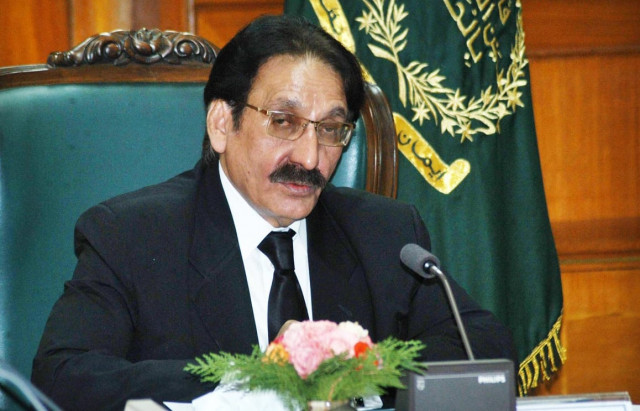Improving education system: SC asks govt to up budget, ensure enrolment
Report submitted to the top court reveals dismal state of schools.

Report submitted to the top court reveals dismal state of schools.
The country’s top court on Friday directed the government to enhance budgetary allocations and develop a mechanism to improve the education system and ensure enrolment at all levels.
A three-judge bench, headed by Chief Justice (CJ) Iftikhar Muhammad Chaudhry, gave the detailed judgment on a suo motu notice on ghost schools as well as the dismal state of education.
The CJ also directed the judges of high courts as well as the apex court to dispose of cases concerning schools’ properties on a fast-track basis.
He directed the government to set up accreditation boards in all the provinces and federal capital to improve the condition of schools and colleges. Action should be taken against those officials who were receiving salaries but not performing their duties, the CJ said.
The apex court had earlier this year taken notice of a ghost school in Sindh and sought report from all provincial authorities and district judges on the issue.

The Supreme Court had constituted a commission comprising district and sessions judges on February 11 this year to investigate ghost schools and ascertain reasons for poor state of government schools.
The report stated that of the 383 schools, excluding colleges, functioning under the Federal Directorate of Education, most lacked basic facilities due to paucity of funds or lack of interest by the authorities.
The report further observed that most schools were upgraded on paper only and the condition was worse off in schools located in the rural areas of Islamabad. Shortage of staff, unavailability of drinking water and lack of boundary walls were some of the problems faced by rural schools, while urban institutes had surplus teaching staff.
The judges were directed to survey areas and submit reports on the number of functional government schools.
The report depicts a gloomy picture of education in the capital’s rural areas and the CJ directed the local administration to comply with the report’s suggestions.
The report observed that the ratio of children studying in capital’s government schools was low compared to private institutions. “It is probably due to poor standards and performance of government schools,” the report read. However, there were no figures to substantiate the claim.
The report highlighted several reasons for encroachments and lack of facilities in the capital’s schools. Political power of land grabbers was noted as the prime reason for this problem in rural areas’ institutes along with unprotected and weak school administration.
Suggestions
Uniformity in ICT’s education policy, allocation of substantial allocation of funds equivalent to at least 10 per cent of the gross domestic product (GDP), competitive recruitment of teachers with special quotas for rural areas, are some of the suggestions given by the top court.
It was further suggested that ad-hoc and daily wage employment of teachers be discouraged along and model schools be introduced in each sector while providing the same facilities in rural areas.
The commission in its report has also questioned the functioning of the Private Educational Institutions Regulating Authority. The body has failed to control exorbitant fees at private schools that only serve a specific income group.
Published in The Express Tribune, November 23rd, 2013.



















COMMENTS
Comments are moderated and generally will be posted if they are on-topic and not abusive.
For more information, please see our Comments FAQ